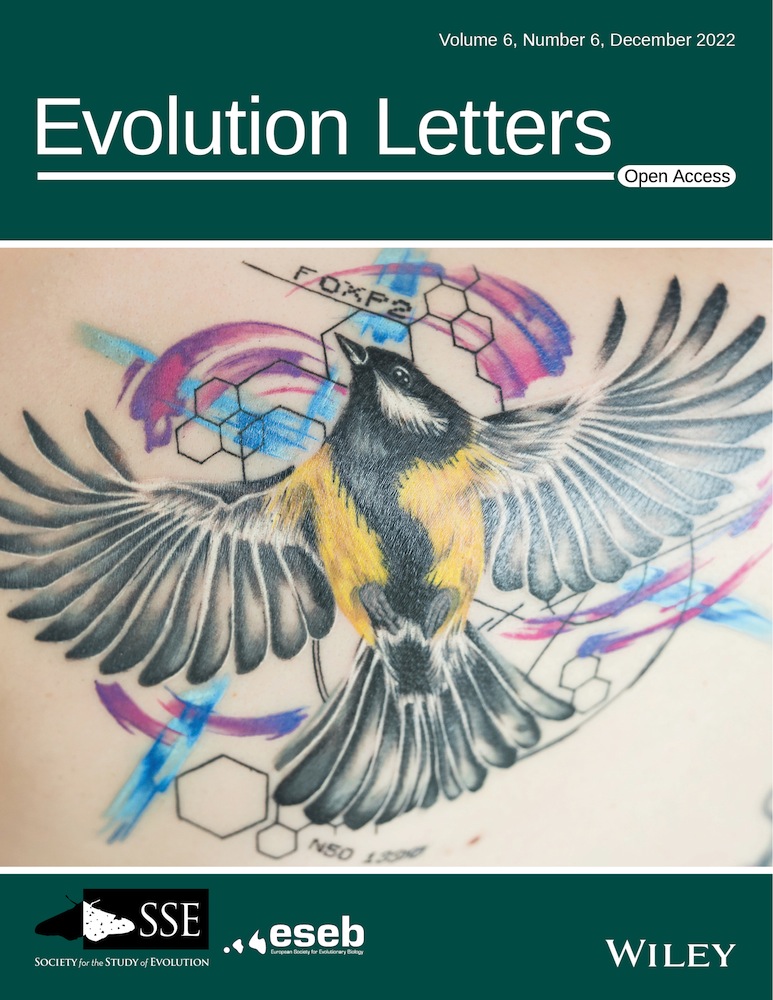Fluctuating selection facilitates the discovery of broadly effective but difficult to reach adaptive outcomes in yeast
IF 3.7
1区 生物学
Q2 EVOLUTIONARY BIOLOGY
引用次数: 0
Abstract
Abstract Evolutionary compromises are thought to be common under fluctuating selection because the mutations that best enable adaptation to one environmental context can often be detrimental to others. Yet, prior experimental work has shown that generalists can sometimes perform as well as specialists in their own environments. Here we use a highly replicated evolutionary experiment (N = 448 asexual lineages of the brewer’s yeast) to show that even though fluctuation between two environmental conditions often induces evolutionary compromises (at least early on), it can also help reveal difficult to reach adaptive outcomes that ultimately improve performance in both environments. Specifically, we begin by showing that yeast adaptation to chemical stress can involve fitness trade-offs with stress-free environments and that, accordingly, lineages that are repeatedly exposed to occasional stress tend to respond by trading performance for breadth of adaptation. We then show that on rare occasions, fluctuating selection leads to the evolution of no-cost generalists that can even outcompete constant selection specialists in their own environments. We propose that the discovery of these broader and more effective adaptive outcomes under fluctuating selection could be partially facilitated by changes in the adaptive landscape that result from having to deal with fitness trade-offs across different environmental conditions. Overall, our findings indicate that reconciling the short- and long-term evolutionary consequences of fluctuating selection could significantly improve our understanding of the evolution of specialization and generalism.波动选择有助于在酵母中发现广泛有效但难以达到适应性的结果
进化妥协被认为在波动选择下很常见,因为最能适应一种环境的突变往往对其他环境有害。然而,先前的实验工作表明,通才有时可以在自己的环境中表现得和专家一样好。在这里,我们使用了一个高度重复的进化实验(N = 448个啤酒酵母的无性谱系)来表明,即使两种环境条件之间的波动经常导致进化妥协(至少在早期),它也可以帮助揭示难以达到最终提高两种环境性能的适应性结果。具体来说,我们首先展示了酵母对化学压力的适应可以涉及与无压力环境的适应性权衡,因此,反复暴露于偶尔压力下的谱系倾向于通过交换性能来适应广度。然后我们表明,在极少数情况下,波动选择会导致无成本通才的进化,这些通才甚至可以在自己的环境中胜过恒定选择专家。我们提出,在波动选择下发现这些更广泛和更有效的适应结果,可能部分是由于必须处理不同环境条件下的适应性权衡而导致的适应景观的变化。总的来说,我们的研究结果表明,调和波动选择的短期和长期进化结果可以显著提高我们对专业化和通用性进化的理解。
本文章由计算机程序翻译,如有差异,请以英文原文为准。
求助全文
约1分钟内获得全文
求助全文
来源期刊

Evolution Letters
EVOLUTIONARY BIOLOGY-
CiteScore
13.00
自引率
2.00%
发文量
35
审稿时长
10 weeks
期刊介绍:
Evolution Letters publishes cutting-edge new research in all areas of Evolutionary Biology.
Available exclusively online, and entirely open access, Evolution Letters consists of Letters - original pieces of research which form the bulk of papers - and Comments and Opinion - a forum for highlighting timely new research ideas for the evolutionary community.
 求助内容:
求助内容: 应助结果提醒方式:
应助结果提醒方式:


